Is Your Dog Nuts About Nuts? Know the Good from the Bad!

Let’s face it, we’re all guilty of passing a nibble of our “human food” to our pups from time to time – and in moderation, that’s perfectly ok, as long as we are well-educated in what’s safe for our dogs to eat!
We all (hopefully) know that chocolate, alcohol, and onions are big no-no’s but here’s where it gets really tricky…nuts. Some nuts are a perfectly fine, tasty treat for dogs and some are really, REALLY bad!

Almonds


Many dogs absolutely love almonds, especially with the wide variety of flavored and seasoned almonds popular today. While almonds are not considered toxic, they are very high in fat and not easily digested which can lead to upset stomach and gastrointestinal discomfort.
Verdict: An occasional almond is ok to feed, but there are much safer, healthier treats available.
Black Walnuts
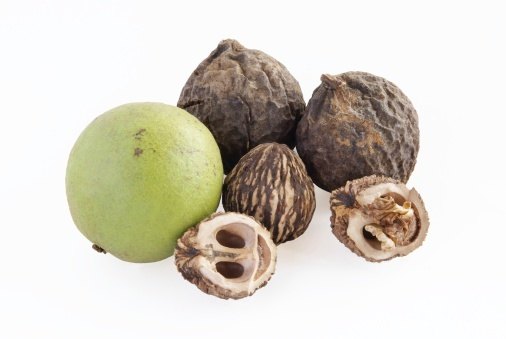

Black walnuts contain a toxin known to cause vascular disease in horses, but has not been shown to cause the same in dogs. However, eating black walnuts can cause gastrointestinal upset or a dangerous obstruction. When moldy, black walnuts can contain tremorgenic mycotoxins which can cause seizures or neurological symptoms.
Verdict: Do not feed.
Brazil Nuts
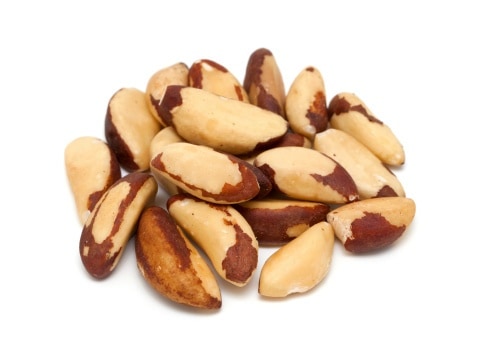

Like almonds, Brazil nuts are not toxic to dogs, but are high in fat and not easily digested. A dog that eats Brazil nuts may experience upset stomach.
Verdict: Ok on occasion, but there are much safer, healthier options available.
Cashews
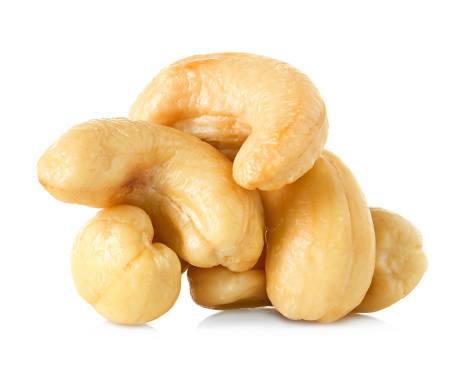

Cashews are not toxic to dogs and are generally safe to feed in moderation – as long as they are cooked or roasted. Raw cashews do contain a toxin that is eliminated through cooking. Because of their fat content, cashews can cause upset stomach.
Verdict: Do not feed raw cashews, but cooked or roasted cashews are generally safe in moderation.
Chestnuts
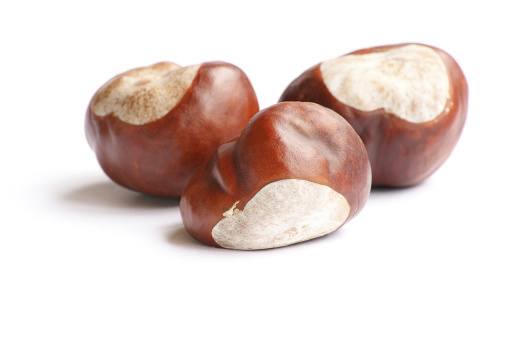

American Chestnuts are not toxic to dogs, however, they can pose a choking or obstruction risk and can lead to gastrointestinal distress when eaten.
Verdict: Ok if ingested, but avoid in favor of better options.
English Walnuts
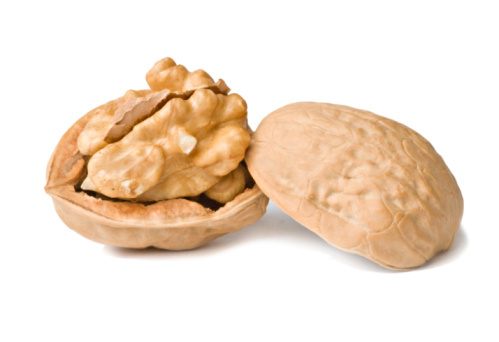

The most commonly snacked type of walnut, English walnuts can lead to upset stomach and gastrointestinal distress or obstruction. Like Black or Japanese walnuts, moldy English walnuts can contain tremorgenic mycotoxins (toxic chemical products produced by fungi) which can cause seizures or neurological symptoms.
Verdict: Do not feed.
Hazelnuts
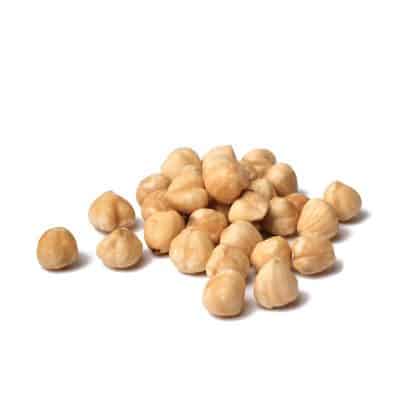

Hazelnuts are not toxic to dogs and are generally safe to feed in moderation. However, because of their size and shape, they can pose a choking or obstruction risk to smaller dogs.
Verdict: Ok to feed on occasion to larger dogs.
Hickory Nuts
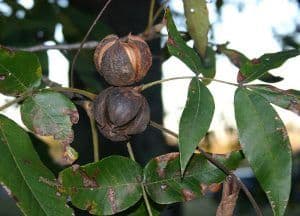

Another nut known to cause laminitis in horses, but not yet proven to cause the same vascular disease in dogs. Hickory nuts can cause gastrointestinal upset or an obstruction. And, like walnuts, moldy hickory nuts can contain tremorgenic mycotoxins which can cause seizures or neurological symptoms.
Verdict: Do not feed.
Japanese Walnuts
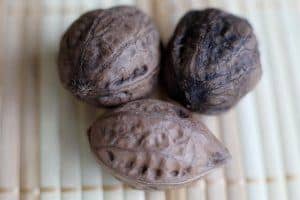

Although Japanese Walnuts are not toxic, they can cause gastrointestinal upset or an intestinal obstruction. Like other types of walnuts named, moldy Japanese walnuts can contain tremorgenic mycotoxins which can cause seizures or neurological symptoms.
Verdict: Do not feed.
Macadamia Nuts
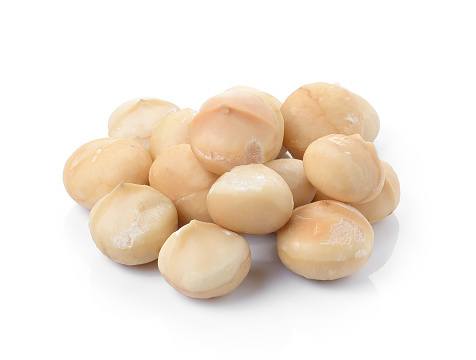

Macadamia nuts are commonly listed as one of the top “human foods” to avoid feeding your dog. These nuts contain an unknown toxin that can lead to neurological issues and are very, very high in fat, which can put your dog at risk for serious gastrointestinal distress or lead to pancreatitis.
Verdict: Absolutely do NOT feed.
Peanuts


Peanuts (which technically aren’t nuts at all but are legumes!) are not toxic to dogs and are frequently used in healthy and safe treats as dogs tend to love the taste. Any peanuts served to your dog should be raw or roasted, unsalted, and without their shells. Peanut butter used as a treat should be natural and only include peanuts without the addition of sugars, salts, or artificial sweeteners.
Verdict: A great treat in moderation.
Pecans
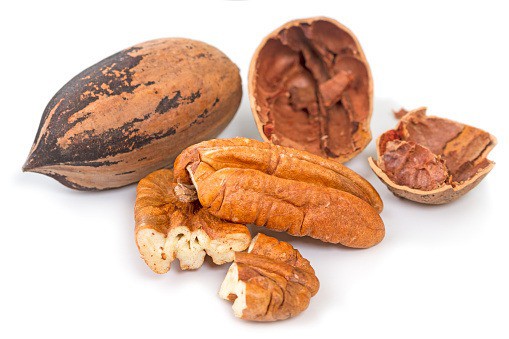

Like walnuts and hickory nuts, pecans have been known to cause laminitis in horses. Feeding your dog pecans can result in gastrointestinal distress or an obstruction. Additionally, moldy pecans can contain tremorgenic mycotoxins which can cause seizures or neurological symptoms.
Verdict: Do not feed.
Pistachio Nuts
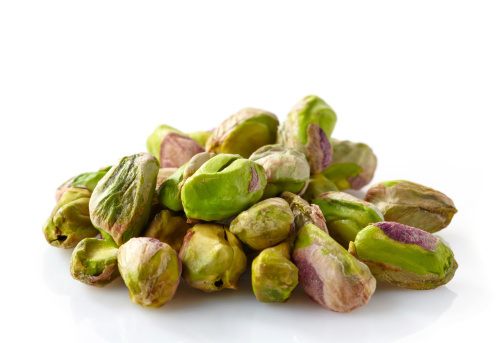

Pistachios, although not toxic to dogs, are another variety of nut which are rich in fat and can lead to upset stomach or pancreatitis.
Verdict: An occasional pistachio, without the shell, is ok, but there are much safer, healthier treats available.
Do you frequently snack on any nuts not mentioned above? Do you have any nut trees in your yard that you’re curious about. Comment the type of nut and we’ll add it to the list!
In the meantime, check out these 10 People Foods You CAN Share With Your Dog!



